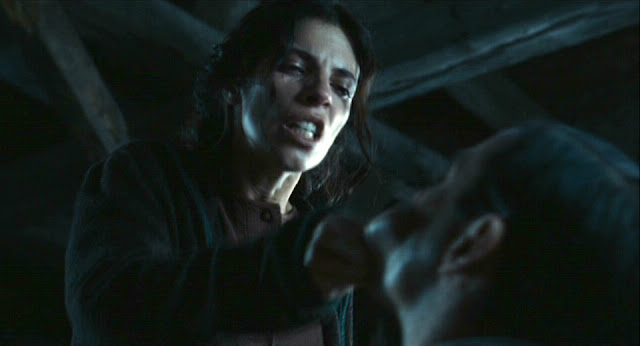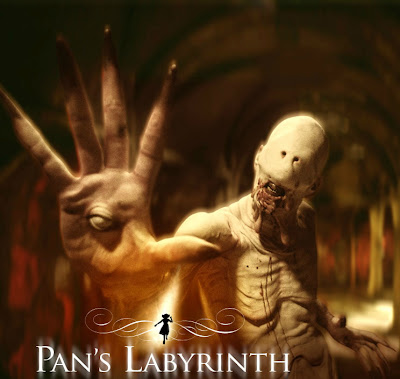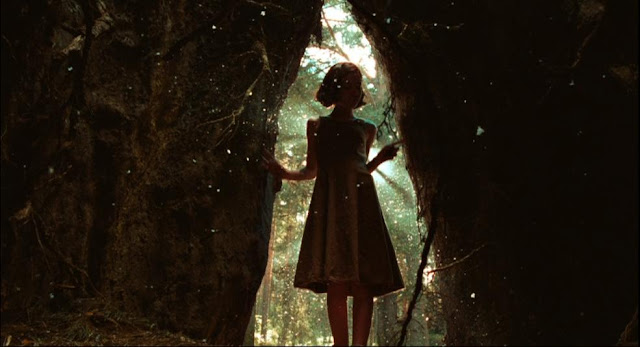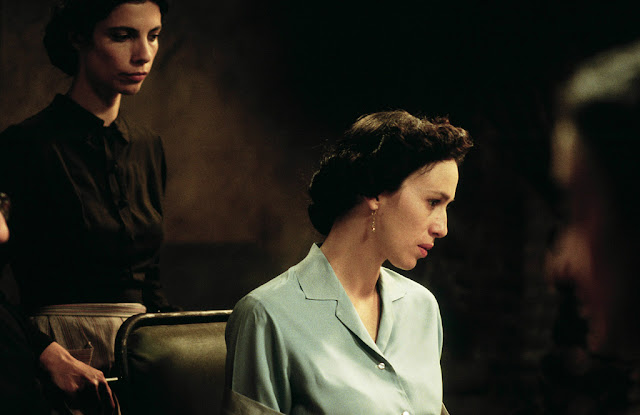Written by Amanda Rodriguez
I unabashedly adore Guillermo del Torro’s Pan’s Labyrinth. It’s beautifully rendered between two dark, cruel worlds. Our heroine, Ofelia, wants to escape the foreignness and brutality of her new life as the stepdaughter of “The Captain,” a cold and violent military officer hunting down rebels as part of Franco’s fascist regime in 1944 Spain. Though full of magic and possibilities, the fantastical Underworld to which she so desperately wants to escape (in which she is a lost princess whose father has searched eons for her) is also full of horrors, danger, and death. The story of this lost young girl striving to be brave and good, striving to believe in a better world despite all the pain and darkness is heartbreaking.
Pan’s Labyrinth passes the Bechdel test while showcasing three unique female characters. There’s young Ofelia herself along with her kind, mild, and beautiful mother, Carmen, and finally Mercedes, the housemaid who is secretly a rebel spy. All these women are depicted with compassion and depth, but let’s examine them each more deeply to see how they fare under a feminist lens.
First we have Ofelia.
Ofelia is an imaginative girl who loves books and her mother. Not only that, but she is a courageous and loyal tomboy who is willing to sacrifice her life as well as her mythic destiny for love of her infant half-brother. At first glance, Ofelia appears to be a strong feminist representation, but as I wrote about in my previous Bitch Flicks review “Brave and the Legacy of Female Prepubescent Power Fantasies”, things aren’t always as they appear. I say Merida from Brave and Ofelia from Pan’s Labyrinth (among others):
“[are] actually situated within a somewhat prolific trope of female prepubescent power fantasy tales. Within this trope, young girls are allowed and even encouraged to be strong, assertive, creative, and heroes of their own stories. I call them ‘feminism lite’ because these characters are only afforded this power because they are girl children who are unthreatening in their prepubescent, pre-sexualized state.”
When Ofelia meets the faun, he insists that, though he’s certain she is the immortal princess, she must undertake three tasks to prove her “innocence” is intact and that she has not truly become mortal yet. Metaphorically speaking, these tests will ensure her virginity; the implication being that if she is no longer a virginal child, she will not be pure enough to take her rightful place as heiress of the Underworld. In fact, when Ofelia must retrieve a dagger from the child-eating monster, her willful indulgence in two grapes nearly sabotages her bid for immortality. The carnality and unnatural appetites of the child-eating monster coupled with the beautiful, forbidden banquet in his chamber set the scene for a reenactment of Eve’s apple eating and the ensuing Fall of Man. The tasting of the forbidden fruit is synonymous with the awakening of sexuality, and when he learns of Ofelia’s inability to control her appetite, the faun cruelly rebuffs her, yelling that she has ruined her chances to return to her true home.
 |
| “You would give up your sacred rights for a brat you barely know? You would give up your throne for him?” – The Faun |
Though Ofelia is the princess, the faun dictates all her rules and tasks, appearing and disappearing as he pleases and demanding she obey blindly. These traits are paralleled with The Captain’s black-and-white thinking as well as his cruel capriciousness. Both worlds are governed by cold patriarchal forces that this young girl must navigate, where she has no power to change the rules or the worlds themselves.
Next there is Carmen, Ofelia’s mother.
Carmen is a gentle and kind woman in an unenviable plight who we watch become drained of hope and life. Her husband, a tailor, dies, and she is left alone to care for her daughter in an uncertain, war-torn city, so she marries the unaffectionate, nearly inhuman Captain Vidal and becomes deathly ill carrying his child. Her poverty and the desperation of her situation are insinuated when Carmen says to Ofelia that The Captain, “has been very good to us. You have no idea.” However, the primary reason she gives Ofelia for marrying The Captain is, “I was alone too long.” Her sexual and relationship needs, the film insists, trump her dire straits. This is a unique characterization of a woman in that her needs as a woman governed her choice, and despite the catastrophic outcome, the film never blames or judges her for being human.
However, Carmen’s defining attribute is her beauty. While she sleeps, Carmen’s adoring daughter speaks to her little brother through Carmen’s belly saying, “She’s very pretty, you’ll see. Even though she’s sad some of the time, when she smiles, you’ll love her.” Not only is Carmen’s beauty of paramount importance, she is primarily concerned with superficial things like pretty dresses, clean shoes, modesty, and that her daughter grow up into a proper young woman. This, in combination with the way she languishes in such a difficult pregnancy, define Carmen as “mother.” Being pregnant with the offspring of such an evil man threatens Carmen’s health and ultimately kills her. Though this tale is magical realism, I’m uncomfortable with the “beautiful vessel” implications that are inescapable in Carmen’s characterization. However, her troubled pregnancy can also be interpreted as her loss of hope. When the story begins, Carmen is full of expectations about how life will be once she and her daughter settle in with The Captain at his base. By the end of her pregnancy, though, she says through lips bleached of life, “As you get older, you’ll see that life isn’t like your fairy tales. The world is a cruel place. And you’ll learn that even if it hurts! Magic does not exist…not for me or anyone.” This is a tragic woman who’s tried to conform to society’s expectations of her by being beautiful, soft-spoken, and proper, but she has still not been afforded a decent life with even a meager offering of happiness.
Lastly, we have Mercedes, the housemaid rebel spy made of steel.
 |
| My…effing…hero… |
Mercedes has infiltrated The Captain’s base, feeding information, supplies, and letters to a secret rebel camp in the forest. She and Ofelia form a bond where Mercedes is at once a maternal figure and a co-conspirator. Despite reproaching herself for the cowardice of her silence, Mercedes suffers the indignities The Captain inflicts upon her without complaint because she is a guerrilla soldier, fighting against a tyrannical political regime with nothing but her wits and her small, dull kitchen knife.
When Mercedes is discovered, The Captain ties her up in the storeroom, preparing to torture her. He insists all his guards leave him to the task, sneering, “For God’s sake, she’s just a woman.” Subtly, Mercedes warns him of his grave underestimation of her, “That’s what you always thought. That’s why I was able to get away with it. I was invisible to you.” The Captain continues to disregard her, and before he realizes it, she’s escaped using her dull kitchen knife to cut the ropes and to stab him repeatedly. When he is at her mercy, she says, “I’m not some old man! I’m not some wounded prisoner! Sonofabitch! Sonofabitch! Don’t you dare touch the girl! You won’t be the first pig I’ve gutted!” She fish hooks him, permanently disfiguring his face.
 |
| “You won’t be the first pig I’ve gutted!” – Mercedes the Supreme Figure of Badassery |
All there is to say is, “Wow.” This pivotal scene shows Mercedes as full of strength, compassion, and unshakable resolve. She asserts her power as a woman, defying not only the gender binary that subjugates women, but defying her class and the military state authoritarian structure as well. She tells The Captain that women aren’t weak like old men or wounded prisoners, and she even cites the power her trade as a kitchen maid has given her before viscerally showing him that power. Even in the height of her rage, Mercedes is still thinking of the welfare of Ofelia, who is her friend, surrogate child, and ally.
The way Mercedes wields her power is starkly contrasted with the way in which the patriarchal figure of The Captain wields his. All three women have a more complex world view than The Captain. Even Carmen who seeks love in the unlikeliest of places because she is full of naive trust appreciates that emotional well-being is of paramount importance. Though Ofelia is only a lost child caught between harsh reality and dark fantasy, even she recognizes the imperative of morality and self-sacrifice when faced with the choice: do evil to gain a reward or do good and lose everything. All three women are flawed, multifaceted characterizations of unique women in a situation made terrible by an oppressive patriarchal force as represented by Captain Vidal. Though the three could be woodenly interpreted as mother, maiden, and child, their individual depth coupled with their oftentimes unexpected strength and clarity give them value in a feminist reading of Pan’s Labyrinth. As feminists, we don’t ask for idealized portrayals of feminist heroines; we ask for complexity, realistic representations of women, and a critical approach to the patriarchal paradigm. Pan’s Labyrinth gives us all that and more.




